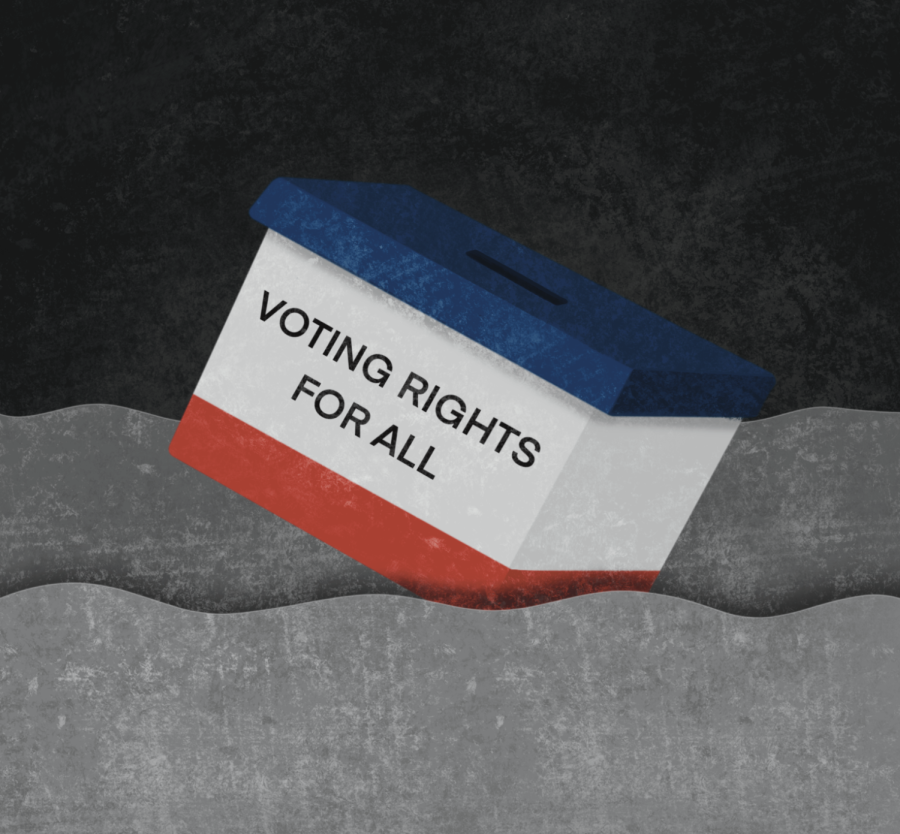Editorial | Congress must pass new voting rights acts
January 19, 2022
Democracy can’t prevail without equal participation. Likewise, democracies only survive with the freedom to vote. Without this guaranteed right, democracy crumbles.
Today in the United States, the right to vote dwindles as prejudiced representatives across the country seek to undermine our democracy. Despite the 2020 election featuring the highest turnout in a century — amid the COVID-19 pandemic —, the Brennan Center for Justice finds “at least 19 states enacted 33 laws that make it harder for Americans to vote” between Jan. 1 and Sept. 27, 2021.
Although in the same period, 25 states enacted 62 measures to expand voting access, the U.S.’s bigoted past appears to repeat itself as majority white delegations from numerous states impede on people of color’s freedom to vote regardless.
Currently, Congress is considering two votings bill that empower and restore voting rights for all. With Republicans already disregarding the important acts, Democrats now possess the opportunity to transcend America’s prejudiced tendencies and to re-establish the equal opportunity to vote.
Congress, i.e. Senate and House Democrats, must pass the Freedom to Vote Act and the John Lewis Voting Rights Advancement Act to ensure our democracy delivers justice to all. With people of color especially targeted in these suppressions, Democrats must prevent the loss of crucial voices in America’s ever-fragile democracy.
Get The Daily Illini in your inbox!
These critical acts set national standards for voting, outlaw partisan gerrymandering, protect election workers and records, reform and add more transparency to campaign finances and update the Voting Rights Act of 1965 to address modern infringements upon it.
Overall, these acts represent vital reform to our neglected voting foundation. Principally, these bills assist disenfranchised Black Americans who have long suffered from inequality at the ballot box.
Despite historical moments overpowering racism — such as the 1965 Act, the U.S. has lacked political commitment to saving the freedom to vote. Without this needed commitment, Supreme Court decisions like Shelby v. Holder in 2013 — which held a section of the 1965 Act unconstitutional — deface the freedom to vote.
If lawmakers legitimately believe in democracy, they’ll safeguard the right to vote. However, if left unchecked, prejudiced motives will triumph American democracy. These suppressive acts restricting and complicating voting conclusively seek to dissuade compelling Black voters. Nevertheless, voting is a right independent of background, class and skin color.
In early January, Senator Raphael Warnock, who originates from the same Georgia church as Dr. Martin Luther King Jr., pressed his Senate colleagues to “find yourself on the right side of history, pushing to get these bills done.”
Correspondingly, these bills couldn’t find a better individual to be named after than fellow Georgian lawmaker and former Rep. John Lewis.
A civil rights hero who led the Selma march and was arrested about 40 times, Lewis’s career fighting for civil rights lives on in the aforementioned acts. Additionally, Lewis lives on in the prolonged fight for freedom and voting rights: an uphill battle since America’s inception.
Still, civil rights require more than one hero. Lawmakers will soon be given the decision to become new champions of voting rights or let democracy fade from America. Furthermore, the freedom to vote in the U.S. doesn’t exist until we all can arrive at the ballot box legally uninterrupted. For now, Congress must choose civil rights over civil suppression.







